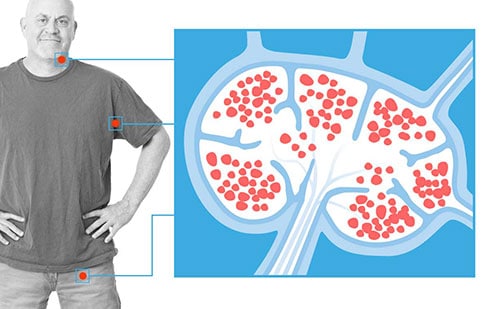Proteins known as RAGs rearrange DNA in blood cells by moving along chromosomes to cut and paste sections of genes. When RAGs make mistakes, genes can improperly turn on and contribute to the development of blood cancers. A research team at Boston Children’s Hospital that includes CRI Fellow Zhaoqing Ba, PhD, has figured out one way these mistakes are made, laying the groundwork for future therapies to correct or contain this abnormal activity. It’s one more step forward in the fight against blood cancer.
This September for Blood Cancer Awareness Month, we look at how we’re working toward a future immune to leukemia, lymphoma, and multiple myeloma.
COVID-19 and Blood Cancer Care

To gain a better understanding of how the global COVID-19 pandemic is impacting clinical cancer care for blood cancer patients, and how our health care system and physicians are adapting to meet the moment, we spoke with Melody Smith, MD, of Memorial Sloan Kettering Cancer Center.
Blood Cancer Patient Story
 In January 2013, Shann was diagnosed with acute lymphoblastic leukemia. Over the last seven years, she has been treated with chemotherapy, a bone marrow transplant, CAR T cell therapy, anti-PD-1 immunotherapy, and most recently, a bi-specific T-cell engager. She responded to treatment, and today, Shann continues to advocate for herself and for others.
In January 2013, Shann was diagnosed with acute lymphoblastic leukemia. Over the last seven years, she has been treated with chemotherapy, a bone marrow transplant, CAR T cell therapy, anti-PD-1 immunotherapy, and most recently, a bi-specific T-cell engager. She responded to treatment, and today, Shann continues to advocate for herself and for others.
Blood Cancer Scientist Spotlight
 Immunotherapy approaches predominantly take advantage of the immune system’s “killer” T cells to identify and kill cancer cells, but they only provide long-lasting relief and benefit in a fraction of patients with B cell cancers. CRI CLIP Investigator Baochun Zhang, MD, PhD, is investigating how “helper” T cells—which lack the ability to directly kill cancer cells—might be used to improve the immune system’s ability to eliminate these blood-based cancers.
Immunotherapy approaches predominantly take advantage of the immune system’s “killer” T cells to identify and kill cancer cells, but they only provide long-lasting relief and benefit in a fraction of patients with B cell cancers. CRI CLIP Investigator Baochun Zhang, MD, PhD, is investigating how “helper” T cells—which lack the ability to directly kill cancer cells—might be used to improve the immune system’s ability to eliminate these blood-based cancers.
Learn more about Dr. Zhang’s blood cancer research
Immunotherapy for Blood Cancer Information Updated

On July 24, 2020, the U.S. FDA granted accelerated approval to brexucabtagene autoleucel (Tecartus™), a CAR T cell therapy that targets the CD19 receptor, for the treatment of patients with relapsed or refractory Mantle cell lymphoma. This is the first cell-based immunotherapy to be approved for this patient population. It’s just one of the many changes in blood cancer in the last year.
VIEW Immunotherapy for Blood Cancer UPDATES
Ask Your Immunotherapy Questions

Join us at the inaugural CRI Virtual Immunotherapy Patient Summit on October 2-3. This free event connects you with cancer patients and immunotherapy experts, all from the comfort and safety of your own home.
REGISTER for the Virtual Summit
Find a Blood Cancer Clinical Trial
 A variety of new and promising cancer immunotherapy treatments are only available to patients in clinical trials. Our Immunotherapy Clinical Trial Finder will match you to trials for which you may be eligible, and you can help speed the development of potentially lifesaving drugs for yourself and others.
A variety of new and promising cancer immunotherapy treatments are only available to patients in clinical trials. Our Immunotherapy Clinical Trial Finder will match you to trials for which you may be eligible, and you can help speed the development of potentially lifesaving drugs for yourself and others.
Support Blood Cancer Research
 CRI CLIP Investigator Markus Muschen, MD, PhD, at City of Hope, has shown in mice that turning off the BCL6 protein in combination with the small molecule ABT-199 could be a simple and nontoxic way to overcome drug resistance in B cell acute lymphoblastic leukemia. Dr. Muschen hopes to test this promising combination therapy in clinical trials soon. This Blood Cancer Awareness Month, support lifesaving cancer immunotherapy research.
CRI CLIP Investigator Markus Muschen, MD, PhD, at City of Hope, has shown in mice that turning off the BCL6 protein in combination with the small molecule ABT-199 could be a simple and nontoxic way to overcome drug resistance in B cell acute lymphoblastic leukemia. Dr. Muschen hopes to test this promising combination therapy in clinical trials soon. This Blood Cancer Awareness Month, support lifesaving cancer immunotherapy research.

